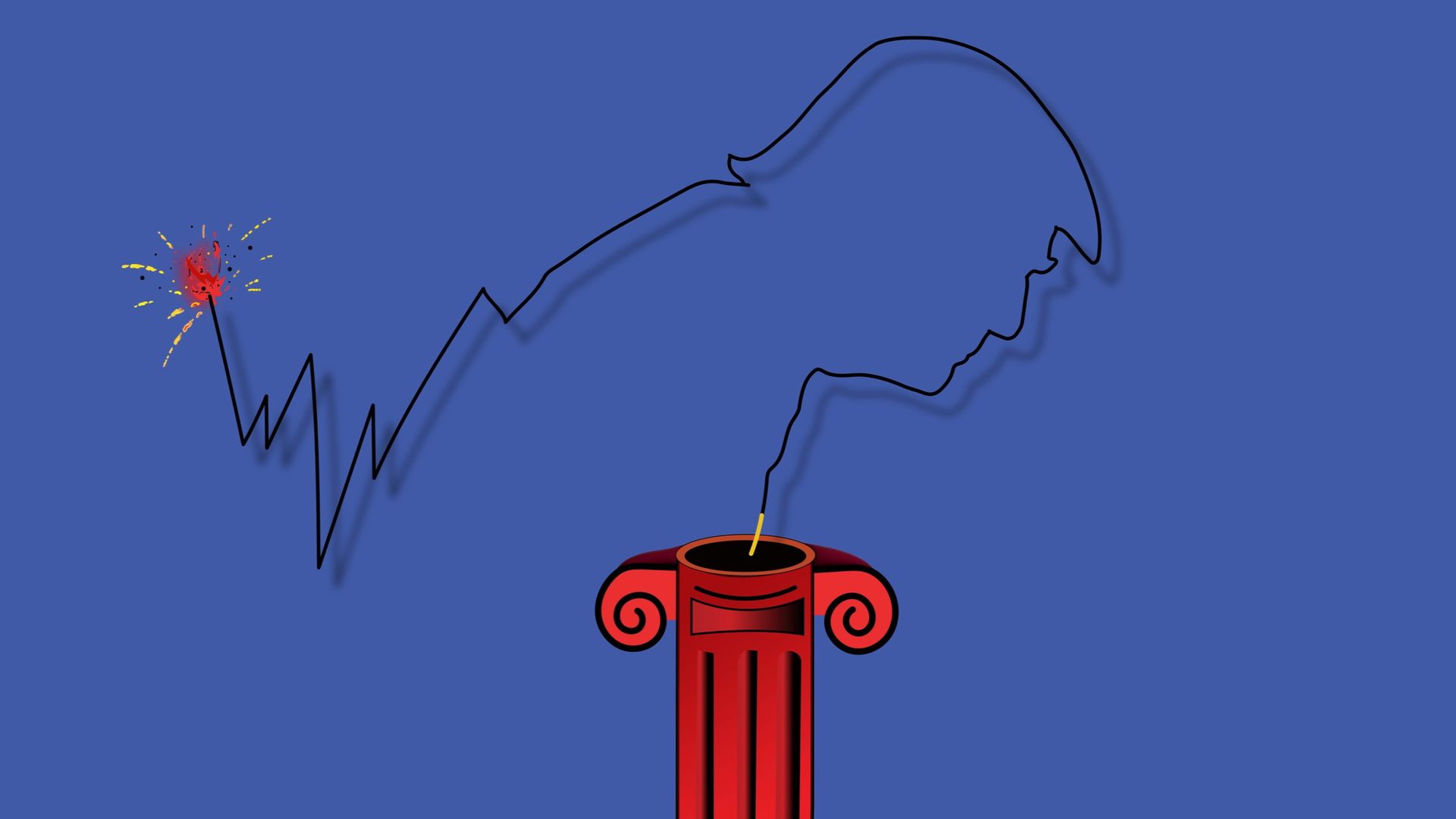尊敬的用户您好,这是来自FT中文网的温馨提示:如您对更多FT中文网的内容感兴趣,请在苹果应用商店或谷歌应用市场搜索“FT中文网”,下载FT中文网的官方应用。

On Tuesday, while the US was voting, I heard a successful American businessman suggest at a dinner that the election could be framed as a choice between prioritising “capitalism” or prioritising “democracy”.
周二,在美国选民还在投票时,我听到一位成功的美国商人在一次晚宴上建议,这次选举可被看作在“资本主义”优先还是“民主”优先之间作出选择。
During the campaign, Democrats often derided Donald Trump for his perceived onslaught on democracy, while Trump attacked Kamala Harris for her allegedly pro-government, anti-capitalist stance. Hence those “Comrade Kamala” memes.
在竞选期间,民主党人经常嘲讽唐纳德•特朗普对民主的所谓猛攻,特朗普则攻击卡玛拉•哈里斯所谓的亲政府、反资本主义立场。因此还出现了“卡玛拉同志”的图梗。
And while both candidates vehemently rejected those caricatures, the mudslinging seems to have stuck, at least in the minds of many business leaders and investors. Just look at the surge in stock prices after the election result, as investors concluded that Trump will be pro-growth and pro-business.
尽管两位候选人都强烈反对这些夸张的描述,但这些恶意中伤似乎已经深入人心——至少在许多商界领袖和投资者心中。只需看看选举结果出炉后飙升的股价,因为投资者的结论是,特朗普将支持增长、支持商业。
The capitalist aura looks especially strong given that Elon Musk, the entrepreneur and co-founder of Tesla, is set to be influential in the next administration, along with hedge fund managers such as Scott Bessent, a leading candidate to be the next Treasury secretary.
考虑到创业家、特斯拉联合创始人埃隆•马斯克(Elon Musk)将在下一届政府中发挥影响力,以及冲基金经理斯科特•贝森特(Scott Bessent)成为下一任财政部长的主要候选人,特朗普身上的资本主义光环看起来尤其强烈。
But as Trump selects his team in the coming weeks, the key question is what variant of “capitalism” the 47th president will uphold. The answer is not clear-cut.
但是,随着特朗普在未来几周挑选他的团队,关键问题是这位第47任总统将奉行哪种“资本主义”。答案并不明确。
When Republicans toss the concept around, they often invoke Adam Smith, the 18th-century Scottish intellectual who pioneered free-market ideas. When I visited then vice-president Mike Pence during the first Trump administration, the only books in his office were the Bible, his boss’s The Art of the Deal and those of Jack Kemp, a Smith-loving ex-American football player turned congressman.
当共和党人谈论这一概念时,他们经常提及开创了自由市场理念的18世纪苏格兰思想家亚当•斯密。当我在特朗普第一任期期间拜访时任副总统迈克•彭斯时,他办公室里摆放的书只有《圣经》、他老板的《交易的艺术》和杰克•肯普的书,后者是一位崇拜斯密的前美式足球运动员,后来成为国会议员。
Today, Trump continues to champion some of the concepts found in Smith’s 1776 classic The Wealth of Nations. He clearly believes in the power of profit-maximising incentives — or greed — to drive growth, echoing Smith’s concept of the “invisible hand”. He shares Smith’s distaste for excessive government interference and high taxes (though unfortunately he rejects Smith’s case for free trade).
如今,特朗普继续倡导斯密1776年的经典著作《国富论》中的一些概念。他显然相信利润最大化的激励(或贪婪)能够推动增长,这与斯密的“看不见的手”概念不谋而合。他与斯密一样厌恶政府的过度干预和高税收(尽管遗憾的是他拒绝接受斯密支持自由贸易的理由)。
And there is another, oft-overlooked, point: an appreciation of family firms. When Smith developed his ideas about markets, the only enterprises around him were family-owned ones (with the notable exception of the joint-stock East India Company, which Smith decried).
还有一点常常被忽视:对家族企业的欣赏。当斯密提出其关于市场的理念时,他周围的企业只有家族企业(除了股份制的东印度公司,斯密对其大加抨击)。
Today, however, the discourse around capitalism is dominated by listed companies and public markets. But ironically, a company such as the Trump Organization would have seemed more familiar to Smith than our modern listed corporate behemoths.
然而,如今,围绕资本主义的讨论主要由上市公司和公开市场主导。但具有讽刺意味的是,斯密可能对特朗普集团这样的公司比对现代上市企业巨头更感觉熟悉。
But the key issue investors now need to ponder is where Trump stands in relation to the other half of Smith’s free-market vision contained in The Theory of Moral Sentiments. Smith viewed this book as his most important work, since he believed the key to building dynamic commerce and markets is to create a system based on shared moral values and trust. That requires transparency, fair play and consistent property rights, since “if [justice] is removed, the great, the immense fabric of human society . . . must in a moment crumble into atoms”. In short, he saw corporate monopolies and capricious abuses of power as anti-capitalist.
但投资者现在需要思考的关键问题是,特朗普对斯密在《道德情操论》中提出的另一半自由市场愿景的态度。斯密认为这本书是他最重要的著作,因为他认为建立充满活力的商业和市场的关键在于创建一个基于共同道德价值观和信任的体系。这就需要透明度、公平竞争和连续的产权,因为“如果(正义)被剥夺,人类社会的伟大、巨大的结构......必会在顷刻间化为乌有”。简言之,他认为企业垄断和任性的权力滥用是反资本主义的。
Will Trump uphold that view too? There is reason to feel nervous. Musk presents himself as an arch capitalist, but has also spent his career railing against rules and seems untroubled by concentrations of power. Trump has faced multiple law suits, and has often appeared to have scant respect for legal contracts.
特朗普也会坚持这一观点吗?有理由感到担忧。马斯克自诩为一个大资本家,但他的职业生涯也一直在抨击各种规则,似乎毫不担心权力集中。特朗普曾面临多起法律诉讼,而且经常表现出对法律合同的漠视。
Meanwhile, figures such as Robert Lighthizer, Trump’s former US trade representative, have repeatedly threatened to rip up trade agreements. Bessent says that this rhetoric is just a negotiating ploy, intended to “escalate to de-escalate” — in other words, to scare opponents into submission. But I believe that a defining feature of the Trump approach is that it tends to embrace a situational, rather than universal, vision of the law. In other words, one that is shaped and applied by the context of power, not always in a uniform way. This runs counter to the ideals that have shaped much of the postwar western order. It is also at odds with the mantra of modern capital markets, which are supposed to be founded on consistent and predictable laws.
与此同时,特朗普的前美国贸易代表罗伯特•莱特希泽等人一再威胁要撕毁贸易协定。贝森特说,这种言论只是一种谈判策略,旨在“以升级实现降级”——换句话说,就是为了吓唬对手屈服。但我相信,特朗普策略的一个决定性特征是,它倾向于采用一种情境化而非普遍化的法律观。换句话说,这种法律观是由权力的背景塑造和应用的,而不总是以统一的方式。这与塑造战后西方秩序的理念相悖。它也与现代资本市场的准则相悖,现代资本市场应该建立在连贯和可预测的法律之上。
Some Trump supporters disagree with me and point out that the capital markets flourished during the first Trump presidency. They also insist that it is the Democrats, not the Republicans, who have weaponised the law with politically motivated prosecutions of Trump (which may now be dropped).
一些特朗普的支持者不同意我的观点,并指出资本市场在特朗普的第一任总统任期内蓬勃发展。他们还坚称,是民主党人,而不是共和党人,将法律武器化,出于政治动机而起诉特朗普(现在可能会撤诉)。
In any case, Bessent and others know what it takes to maintain the confidence of capital markets, having lived in them for years, and seem determined to avoid anything that might spark a financial crash. Indeed, fear of falling asset prices could help to rein Trump in and dissuade him from pursuing more radical ideas.
无论如何,贝森特和其他人知道如何维持资本市场的信心,他们已经在资本市场纵横多年,似乎决心避免任何可能引发金融崩溃的事情。事实上,对资产价格下跌的担忧可能有助于制约特朗普,并阻止他追求更激进的想法。
Yet as equity markets surge amid excitement at the election of a supposedly pro-business, “capitalist” candidate, investors should remember the two sides to Smith. Unfettered competition can certainly drive growth — even crony capitalism can produce a sugar high. But “moral sentiments” — trust and the rule of law — are essential for long-term prosperity. Let us pray that the next administration remembers this.
然而,随着股市在一位据称亲商的“资本主义”候选人胜选的兴奋中飙升,投资者应该记住斯密论述的两面。不受约束的竞争肯定能够推动增长——即使裙带资本主义也能带来短时的繁荣。但“道德情操”——信任和法治——对长期繁荣至关重要。让我们祈祷下届政府能记住这一点。